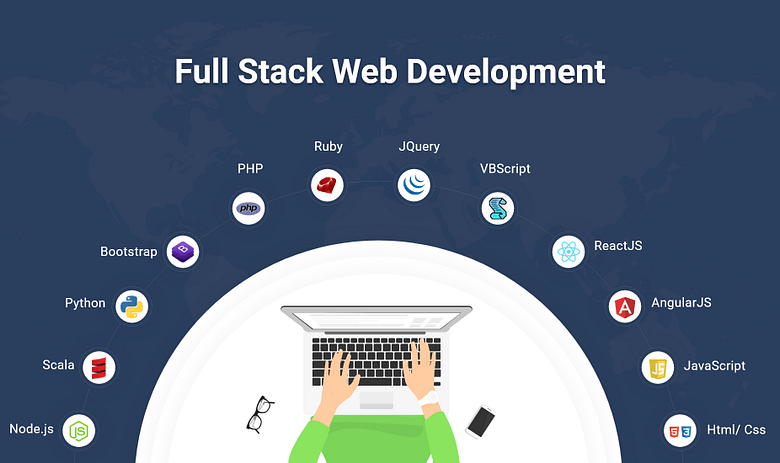The Comprehensive Roadmap to Becoming a Full Stack Developer

Full stack development is a sought-after skill set in the ever-evolving tech industry. Full stack developers possess the knowledge and expertise to handle both frontend and backend development, making them versatile professionals capable of delivering end-to-end solutions. In this blog post, we will explore the detailed roadmap to becoming a full stack developer, covering the essential skills, technologies, and best practices required for success. Whether you aspire to provide MVP development services or full stack development services, this roadmap will guide you on your journey to becoming a proficient full stack developer.
Mastering Frontend Development
Frontend development forms the foundation of a full stack developer’s skill set. Start by acquiring a solid understanding of HTML, CSS, and JavaScript—the core technologies of web development. Learn to create well-structured and responsive web pages, implement modern design principles, and ensure cross-browser compatibility. Familiarize yourself with popular frontend frameworks such as React, Angular, or Vue.js to build dynamic and interactive user interfaces.
Backend Development and Databases
To excel as a full stack developer, you must gain proficiency in backend development and understand how to handle server-side logic. Learn a backend programming language such as Python, Node.js, or Ruby, and explore frameworks like Express, Django, or Ruby on Rails. Understand concepts such as routing, handling requests, and managing databases.
Additionally, familiarize yourself with relational databases like MySQL or PostgreSQL, as well as NoSQL databases like MongoDB or Firebase. Gain expertise in creating efficient database schemas, writing complex queries, and ensuring data integrity.
API Development and Integration
Being proficient in building and consuming APIs is crucial for full stack developers. Learn how to design and develop RESTful APIs, ensuring proper data representation and adhering to industry best practices. Understand concepts like authentication, authorization, and data validation. Familiarize yourself with tools and frameworks like Express.js, Flask, or Laravel for creating robust APIs.
Integration of external services and APIs is another vital aspect of full stack development. Learn how to communicate with external APIs, handle authentication, and process data from different sources.
Version Control and Collaboration
Proficiency in version control systems like Git is essential for effective collaboration and code management. Learn the fundamentals of Git, including branching, merging, and resolving conflicts. Understand how to use platforms like GitHub or Bitbucket for hosting repositories and collaborating with other developers.
DevOps and Deployment
Full stack developers should have a good understanding of DevOps principles and deployment processes. Learn about continuous integration and deployment (CI/CD) pipelines to automate the build, testing, and deployment of applications. Familiarize yourself with cloud platforms such as AWS, Azure, or Google Cloud, and understand how to deploy applications and manage infrastructure.
Security and Performance Optimization
As a full stack developer, it’s crucial to prioritize security and optimize application performance. Learn about common security vulnerabilities and best practices for securing web applications. Understand techniques for optimizing frontend and backend code to enhance performance and scalability.
Continuous Learning and Keeping Up with Industry Trends
The tech industry is constantly evolving, and full stack developers must stay updated with the latest technologies and trends. Engage in continuous learning by exploring new frameworks, tools, and methodologies. Follow industry blogs, participate in online communities, and attend conferences or meetups to network with fellow developers and expand your knowledge.
Conclusion
Becoming a proficient full stack developer requires dedication, continuous learning, and hands-on experience. By following this comprehensive roadmap, you can acquire the necessary skills and knowledge to excel in full stack development. Whether you aspire to offer MVP development services or full stack development services, this roadmap will provide you with the foundation to create robust, end-to-end solutions. Remember to practice regularly and work on real-world projects to apply your skills and gain practical experience.
As you progress on your full stack developer journey, consider leveraging MVP development services and full stack development services to enhance your learning and growth. Collaborating with experienced professionals and working on diverse projects can provide valuable insights and broaden your understanding of full stack development best practices.
Remember that becoming a full stack developer is a continuous process, and the roadmap provided here serves as a starting point. Stay curious, embrace new technologies, and strive for continuous improvement. The tech industry is dynamic, and by staying adaptable and open to learning, you can keep pace with the evolving landscape.
The roadmap to becoming a full stack developer involves mastering frontend and backend development, acquiring database and API integration skills, understanding version control and collaboration, embracing DevOps and deployment practices, prioritizing security and performance optimization, and continuously learning and keeping up with industry trends.
By following this roadmap and dedicating yourself to continuous learning and practical application, you can position yourself as a competent full stack developer capable of delivering comprehensive solutions. So, embark on this exciting journey, expand your knowledge, and unlock a world of opportunities in the field of full stack development.




